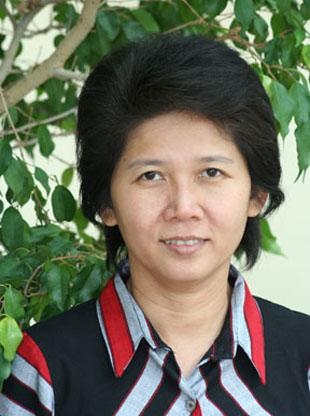PROVIDENCE, R.I. [Brown University] — Brown University’s International Writers Project (IWP) will host There Will Still Be Light: A Freedom to Write Literary Festival, from Monday, April 20, through Thursday, April 23, 2009. The festival features a series of readings, panel discussions, a film festival, and art exhibition celebrating freedom of expression and the art and culture of Brown's current IWP Fellow, Ma Thida, a Burmese fiction writer and practicing surgeon.
There Will Still Be Light begins on Monday, April 20, 2009, with an opening reception and exhibition of art work by “Mr. Burma,” the exiled Burmese cartoonist Win Tun, as well as four other artists at 4:30 p.m. in Pembroke Hall. Throughout the festival, acclaimed writers Amitav Ghosh, Paul Auster, Siri Hustvedt, Joanne Leedom-Ackerman of PEN International, Larry Siems, director of the Freedom to Write program at the PEN American Center, and others will take part in panel discussions and give readings of their works. Each day will also feature screenings of Burmese films. All events are free and open to the public.
Thida will open two days of the festival by leading Vipassana meditation sessions, just as she practiced during her years in prison while serving time for her work to promote democratic change in Burma. The author was sentenced to 20 years imprisonment in Yangon’s Insein jail in 1993, accused of “endangering the public peace, having contact with illegal organizations, and distributing unlawful literature.” Thida served five years, six months, and six days in prison, mostly in solitary confinement. She says she survived the harsh treatment by meditating for as many as 20 hours per day. Thida was released in 1999 on humanitarian grounds. She has been in residence at Brown since September.
“Thida’s presence on campus this year has provided a daily reminder, during a time of such darkness in her homeland, of the integrity, resilience, and grace of the Burmese people,” said Robert Coover, literary arts professor and director of the IWP. “This country, too, has been through a dark time, particularly with regard to freedom of expression, but the times, we have reason to hope, they are a-changin’. Keeping all international channels open and thought flowing freely is a primary objective of our freedom to write program at Brown, of which this festival is a celebrative reflection.”
The International Writers Project
Brown University has a long history of providing support to international writers facing persecution and suppression of their work. The University has welcomed dozens of exiled writers at past festivals on campus, and has hosted fellows from Cuba, China, the Congo, Somalia and Iran. Brown is a member of the International Academy for Scholarship and the Arts, a consortium of 20 colleges and universities committed to providing support for writers facing political oppression. Through its faculty and alumni, Brown has links to Amnesty International, Human Rights Watch, and PEN.
Since 2003, the International Writers Project Fellowship at Brown University has provided institutional, artistic and social support to writers who face personal danger, oppression and/or threats to their livelihood in nations throughout the world. The fellowship, sponsored by a grant from the William H. Donner Foundation, is awarded annually to a writer who is unable to practice free expression in his or her homeland. In addition, the IWP sponsors festivals such as There Will Still Be Light that celebrate the cultural heritage of each fellow and seek to increase awareness of the situation of international writers worldwide and in the IWP fellow’s homeland.
Thida is the sixth IWP Fellow. Her predecessors include Zimbabwean novelist Chenjerai Hove, Iranian novelists Moniro Ravanipour, Shahriar Mandanipour, and Shahrnush Parsipur, and Congolese playwright Pierre Mumbere Mujomba.
For more information, visit http://www.brown.edu/Conference/IWP/Burma/.
There Will Still Be Light: A Freedom to Write Literary Festival
Monday, April 20
- 4:30 p.m. — Opening Reception and Welcome
Exhibition of art works by “Mr. Burma,” Maung Maung Aung, Win Pe, Htein Lin, and Chaw Ei Thein
Pembroke Hall, 172 Meeting St.
Tuesday, April 21
- 10 a.m. — An Introduction to Vipassana Meditation
Led by Thida, McCormack Family Theater, 70 Brown St. - 2 p.m. — Pleading Not Guilty, A Freedom to Write Panel
Featuring Thida, Joanne Leedom-Ackerman, Myo Myint Nyein, Paul Auster, and Siri Hustvedt; moderated by Larry Siems, director of the Freedom to Write and International Programs at PEN American Center, with introduction by Robert Coover, director of the IWP
Joukowsky Forum, Watson Institute, 111 Thayer St. - 4 p.m. — Burmese Film Festival
McCormack Family Theater, 70 Brown St. - 8 p.m. — Reading by Paul Auster and Siri Hustvedt
MacMillan Hall, Room 117
Wednesday, April 22
- 2 p.m. — Fork in the Road: Literature and Art Under the Burmese Military Regime
Panel featuring Win Pe, Amitav Ghosh, Karen Connelly, Mr. Burma, Vicky Bowman; moderated by Ma Thida, 2008-2009 IWP Fellow
McCormack Family Theater, 70 Brown St. - 4 p.m. — Burmese Film Festival
McCormack Family Theater, 70 Brown St. - 8 p.m. — Readings by Thida and Karen Connelly
Traditional Burmese songs by Win Pe and Nay Win Myint
McCormack Family Theater, 70 Brown St.
Thursday, April 23
- 10 a.m. — An Introduction to Vipassana Meditation
Led by Thida, McCormack Family Theater, 70 Brown St. - 2 p.m. — Through the Glass Palace: Reflections on Asian Colonial and Post-Colonial History
Panel featuring Amitav Ghosh, Nay Win Myint, Myo Myint Nyein, Win Pe; moderated by Patricia Symonds, Brown University
McCormack Family Theater, 70 Brown St. - 4 p.m. — Burmese Film Festival
McCormack Family Theater, 70 Brown St. - 6 p.m. — Readings by Amitav Ghosh and Nay Win Myint
Smith Buonanno Hall, Room 106

